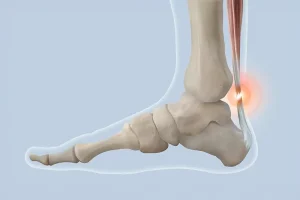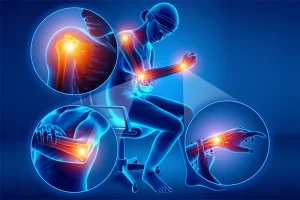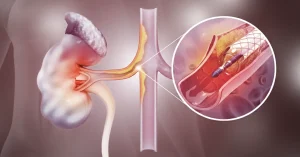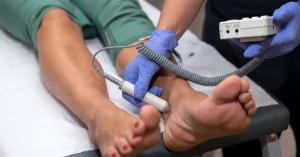Hand tremor is a common condition that can appear occasionally or repeatedly, either without an obvious cause or in connection with a medical condition. It can be a normal reaction to stress, strong emotions, or fatigue, but sometimes it indicates a neurological, endocrine, or metabolic problem that requires careful investigation.
At VenArt Clinic, we often see patients who mention hand tremors while being treated for other conditions. We encourage you not to ignore this seemingly minor symptom. Early detection of the underlying cause is key to a correct diagnosis and effective treatment plan.
What Are Hand Tremors?
Tremor is an involuntary, rhythmic movement of the hand or fingers that you cannot control. Sometimes the movement is so mild that you barely notice it. Other times, it can be disruptive and interfere with daily tasks like holding a glass, writing, buttoning a shirt, or using your phone.
Tremors can affect one or both hands and can appear:
- At rest, when the hand is relaxed;
- During movement, when you reach for an object;
- In certain positions, for example, when holding your arm outstretched.
Common Causes of Hand Tremors
1. Physiological (Normal) Tremor
A slight, almost invisible tremor can occur under normal conditions. For example:
- After a sleepless night or intense mental effort;
- After drinking large amounts of coffee, energy drinks, or cola, which contain high caffeine levels that stimulate the nervous system;
- During intense emotions like fear, anger, or public speaking;
- When you are very hungry or your blood sugar drops;
- After strenuous physical activity without proper hydration.
This type of tremor usually disappears when your body returns to balance.
2. Essential Tremor
Essential tremor is more pronounced and can affect otherwise healthy people. It is often hereditary and tends to progress gradually over time.
Examples include:
- Hands shaking when signing a document or bringing a spoon to your mouth;
- Difficulty pouring water into a glass without spilling;
- A family history of similar tremors in parents or grandparents.
Essential tremor does not affect other body functions and is not dangerous, but it can be distressing and sometimes embarrassing.
3. Parkinson’s Disease
Parkinson’s is a chronic neurological condition that affects movement control. A classic sign is a tremor at rest that stops when the hand is in use.
Typical signs:
- One hand shakes when resting but not when holding an object;
- Difficulty initiating movements or a noticeable slowing of your walking pace;
- Handwriting becomes smaller or more cramped;
- Posture or balance changes without realizing it.
If you are over 60 and have these signs, consult a neurologist.
4. Hormonal and Metabolic Disorders
Tremors can also result from hormonal imbalances, especially in cases like:
Hyperthyroidism:
- The thyroid produces too many hormones;
- Fine but constant tremor, more visible with an outstretched hand;
- Other signs include weight loss, sweating, irritability, and rapid heartbeat.
Hypoglycemia:
- Common in people with diabetes, but can also happen if you skip meals;
- Symptoms include tremors, dizziness, weakness, cold sweats, and intense hunger;
- These usually improve after consuming something sweet, like juice or fruit.
5. Side Effects of Medications
Some medicines can cause tremors as a side effect:
- Antidepressants or anxiety medication;
- Asthma inhalers (such as salbutamol);
- Medications for high blood pressure or neurological conditions;
- Corticosteroids.
Always speak with your doctor before changing or stopping any treatment. Do not stop medication without medical advice. At VenArt Clinic, we can help you identify the cause and guide you toward the right solution.
6. Alcohol and Alcohol Withdrawal
Tremors can appear:
- In the morning, after heavy drinking the night before;
- A few hours after stopping alcohol suddenly in dependent individuals;
- In severe cases, withdrawal can cause agitation, hallucinations, or seizures — this is a medical emergency.
7. Other Neurological Disorders
In rare cases, hand tremors can signal other conditions:
- Multiple sclerosis;
- Stroke;
- Head trauma;
- Brain tumors.
When to See a Doctor
See a specialist if:
- The tremor starts for no clear reason and lasts several days;
- It worsens or becomes more frequent;
- It comes with other signs like dizziness, weakness, or speech problems;
- It affects daily activities like writing, eating, or dressing;
- You have a family history of tremors, Parkinson’s disease, or neurological conditions.
How the Diagnosis Is Made
Your doctor will begin with a detailed clinical exam, which includes:
- Observing the tremor at rest and during movement;
- Checking muscle strength, reflexes, and coordination;
- Asking about lifestyle, diet, and medical history.
Additional tests may include:
- Blood tests for thyroid function, blood sugar, or electrolytes;
- Brain imaging (MRI or CT scan);
- Electromyography (EMG);
- A detailed neurological assessment.
Treatment for Hand Tremors
Treatment depends on the cause and how much the tremor affects daily life:
- Physiological tremor: Rest, manage stress, reduce caffeine;
- Essential tremor: Medication (propranolol, primidone), sometimes botulinum toxin injections or deep brain stimulation;
- Parkinson’s disease: Specialized neurological treatments;
- Hormonal or metabolic issues: Correct the underlying condition (thyroid or blood sugar);
- Medication side effects: Adjust treatment under medical guidance.
In some cases, physical therapy and coordination exercises can help reduce tremors. Talk to our doctors and see how
Frequently asked questions
Is hand tremor always a sign of illness?
No. It is often a normal response to stress, fatigue, hunger, or caffeine. If it disappears quickly and does not return, it is usually not a concern.
What can I do to reduce tremor?
Stay rested, limit caffeine, manage stress, and follow your doctor’s advice.
What tests might be needed?
Blood tests, brain imaging, or an EMG, depending on what your doctor recommends.











